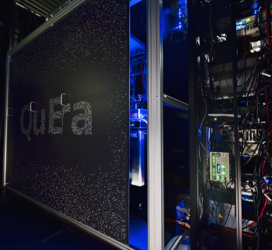Quantum computers are poised to revolutionize our world, not only by efficiently solving intractable problems that classical computers can’t, but also by enabling the development of new energy-saving technologies. This dual-pronged approach to energy savings – an enhanced computational efficiency and the facilitation of innovative energy-saving technologies – is set to redefine the landscape of high-performance computing and energy conservation.
Unleashing new energy-saving technologies
Quantum computers, with their superior computational capabilities, can expedite the discovery and development of new energy-saving technologies. For instance, they could lead to the creation of more efficient electric vehicle batteries, a better understanding of the Haber Bosch process for ammonia production, energy savings through optimized routing in logistics, and the development of more efficient solar cells.
While its full potential is still decades away, recent advances indicate that early-generation machines—those that will be available in the 2020s and early 2030s—could contribute substantially to some of the highest-impact technologies for combating global warming.
Quantum computing has potential in developing new catalysts for green ammonia production, green hydrogen power, and carbon capture. It also discusses the role of quantum computing in the development of new materials and optimization of fluid dynamics and logistics.
In the realm of electric vehicles, quantum computers could help design batteries with higher energy densities and faster charging times, significantly improving the range and usability of these vehicles. Similarly, a better understanding of the Haber Bosch process, which is responsible for a significant portion of global natural gas consumption, could lead to more energy-efficient methods of ammonia production.
In logistics, quantum computers could optimize routing, reducing the distance traveled by vehicles and thus saving fuel. In the field of renewable energy, they could help design more efficient solar cells, increasing energy conversion efficiency and making solar power a more viable alternative to fossil fuels.
The energy efficiency of quantum computers
Now, let's consider the energy efficiency of quantum computers themselves. The world’s most powerful supercomputers, as listed in the “Top500”, consume enormous amounts of energy, with some nearing 30 megawatts.
For instance, the Frontier supercomputer, which resides at Oak Ridge National Labs, requires 21.1 megawatts to operate. The energy cost for this computer (based on the US Energy Information Administration’s report of the average electricity cost of commercial customers) is over $23 million per year.
In contrast, the 256-qubit Aquila neutral-atom quantum computer from QuEra, one of the largest publicly-accessible computers in the world, consumes less than 7 KW, which is less than 0.05 percent of the consumption of this powerful classical supercomputer. While the QuEra computer is efficient, quantum computers from manufacturers such as IBM, Rigetti, Google, and D-Wave also consume approximately 10-25 kW.
Supercomputers are essentially a network of interconnected CPUs (Central Processing Units) and GPUs (Graphics Processing Units). The computational prowess and power consumption of a supercomputer scale almost linearly with the number of these processors. Essentially, to double the computational speed, you would need approximately twice the number of processors.
In stark contrast, the computational capacity of a quantum computer increases exponentially with the number of qubits, thanks to the quantum phenomena of superposition and entanglement. This exponential growth underpins the potential of quantum computers to outstrip the computational power of supercomputers.
Moreover, this exponential growth in computational power doesn't translate into a similar growth in power consumption for quantum computers. As a result, quantum computers are expected to maintain significantly higher power efficiency compared to their supercomputer counterparts, even when delivering comparable or superior computational performance.
Granted, the QuEra’s 7kW 256-qubit computer cannot yet match the computational prowess of Frontier, but in a couple of generations – perhaps when it reaches – 10,000 qubits – it could match Frontier in some applications. We project that a QuEra computer equipped with 10,000 qubits - a quantum computer more powerful than most supercomputers - would still consume less than 10 KW of power. This estimate takes into account the minimal additional energy required to maintain the extra 10,000 atoms (qubits) in position, as well as a slight increase in control electronics.
This 10kW for 10,000 qubits would still be less than one-tenth of a percent of the power consumption of the most powerful classical supercomputers. If that 10,000-qubit computer could perform just 5 percent of the tasks that Frontier performs, it would reduce energy consumption by nearly 10 gigawatt-hours per year and save over $1 million dollars.
In short, quantum computers can compute more yet consume less.
As of 2021, global data center electricity use was estimated to be between 220-320 TWh, which accounted for approximately 0.9-1.3 percent of global final electricity demand. To help reduce this one percent of energy consumption, governments could encourage businesses to adopt quantum computers as part of their sustainability programs.
For instance, the government could offer tax breaks to companies that invest in quantum computing or fund quantum computing research to make it more accessible to businesses, unleashing energy innovation while, at the same time, driving down energy consumption.
In conclusion, quantum computers could usher in not only a new era of computational problem-solving but also energy-friendly technology developments and a more sustainable approach to high-performance computing. Increased computational capacity – enough to develop new materials and methods - does not come at the expense of our planet's resources. This is the true power of quantum computing - a power that goes beyond qubits and algorithms to include sustainability and energy efficiency.








